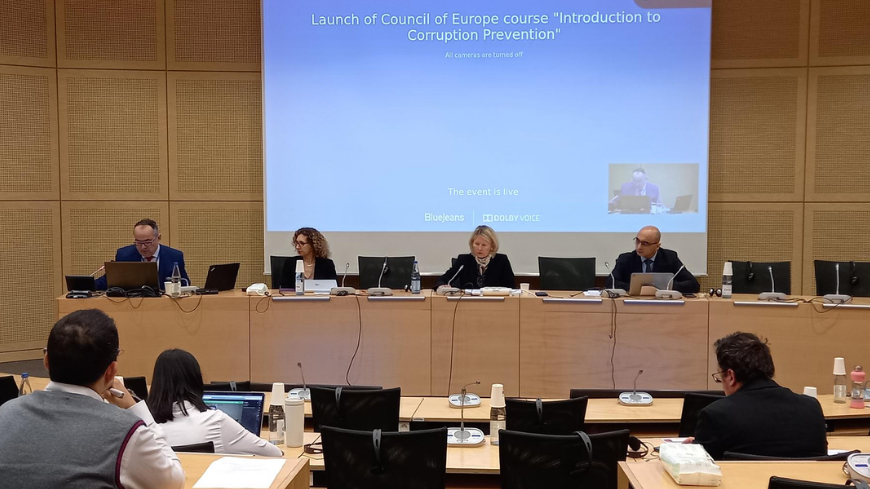On 26 April 2022, the Council of Europe held an online event to launch the e-course on ‘Introduction to Corruption Prevention’.
The course aims to support the understanding of preventive tools for a greater awareness of the integrity standards that apply to public officials. It puts in the spotlight ethical dilemmas and challenges in implementing anti-corruption measures. Through reflection exercises, quizzes, and scenarios, it engages the learners into exploring how to deal with ethical dilemmas. It also brings clarity to the approach taken by the Council of Europe with respect to these issues, as contained in the standards set by the Council of Europe conventions, resolutions, and other instruments, and provided in the recommendations of Group of States against Corruption (GRECO), the Council of Europe’s anti-corruption monitoring body.
During the event, the speakers stressed that corruption continues to present a threat to basic principles and values of the Council of Europe, undermines democracy, rule of law and enjoyment of human rights, erodes confidence in public institutions and hinders quality of life. In this context, the course is expected to contribute to a greater awareness of the integrity standards that apply to public officials and provide an opportunity to learn about the approach taken by the Council of Europe in the fight against corruption.
The course is intended for anyone interested in following and understanding the basics of preventing corruption. It is suitable for “beginners” as well as for those who already have knowledge about the prevention of corruption but are interested to find new and specific perspectives. The course is comprised of 13 modules, reflecting the range of prevention tools addressing variety in the nature and forms of corruption. It provides an overview of:
- forms of corruption and prevention tools,
- ethics and how codes of conduct promote ethical behaviour,
- conflicts of interest and ways of managing such situations,
- purpose and enforcement of post-employment restrictions,
- regulating management of gifts,
- aims of asset declarations systems,
- role of free access to information in corruption prevention,
- regulating lobbying activities,
- transparency of political financing, protecting whistleblowers,
- corruption risks in public procurement and measures to mitigate them, and
- the role of auditing in anti-corruption.
The course was developed by the Economic Crime and Cooperation Division in cooperation with the Human Rights Education for Legal Professionals (HELP) Programme. It was developed in the framework of the Council of Europe and European Union joint Project to support independent bodies in Tunisia (PAII-T) which is co-financed by the European Union and the Council of Europe, and implemented by the Council of Europe.
The course can be accessed by visiting the Council of Europe HELP online platform. It is currently available in English language, and it can be translated and launched in tutored format in collaboration with interested national institutions.
More information:
- Course introduction
- COEHELP e-learning platform
- Economic Crime and Cooperation Division (ECCD)
- Group of States against Corruption (GRECO)
- Human Rights Education for Legal Professionals Programme (HELP Programme)
Follow us on social media:
- Twitter HELP - Twitter DG1 - Facebook - LinkedIn - Instagram - YouTube








